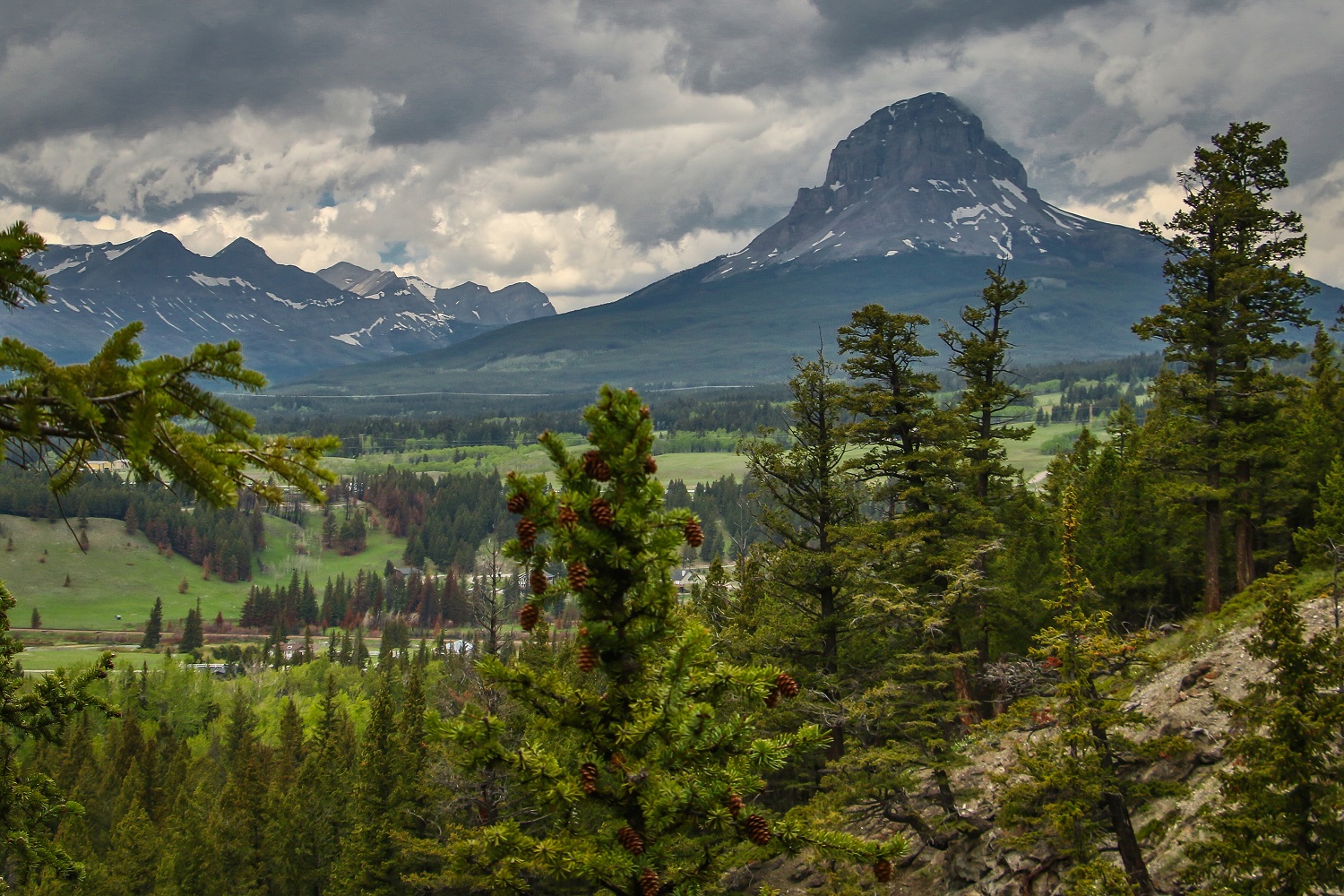Sometimes getting away from it all is as easy as heading out to explore your own backyard. The Crowsnest Pass, a two-and-a-half-hour drive southwest of Calgary, offers year-round outdoor recreation opportunities. While spring is just around the corner, there is still an opportunity to enjoy a winter visit. Southwestern Alberta is a winter wonderland, no matter whether you’re skiing, snowshoeing, fat biking or walking. It’s rich in history, with evidence of human presence stretching back 11,000 years, and more recently, a colourful mining past.
“The natural environment we have down in the Pass, with all the outdoor activities, summer and winter, is why a lot of people come,” says Dawn Rigby, owner and executive chef of Country Encounters B&B and Encounters Wine Bar & Small Plate Kitchen in Coleman. “It’s got beautiful natural scenery, without the crowds.”
The Crowsnest Pass is a good base for downhill skiing – with Fernie Alpine Resort to the west and Castle Mountain Resort to the east – as well as Pass Powderkeg Ski Hill off Highway 3 in Blairmore – “a great learning hill,” says Country Encounters co-owner and Red Seal certified chef, Mark Rigby (Dawn’s husband).
Other winter activities in the Crowsnest Pass include cross-country skiing, snowshoeing, ice fishing, skating, waterfall ice climbing and snowmobiling.
Arts and culture
“Besides the outdoor activities, there is a huge historical and cultural scene. There’s a huge art scene here as well,” says Dawn. The Crowsnest Pass has the longest-running amateur symphony in the country, and on the most recent artist studio tour, pre-COVID-19, 23 artist studios took part.
“It’s all very local, and there is a huge variety of restaurants. It’s amazing for such a small town.” (The Crowsnest Pass, with a population of just over 5,600, is a municipality made up of the towns of Frank, Bellevue, Blairmore, Hillcrest and Coleman).
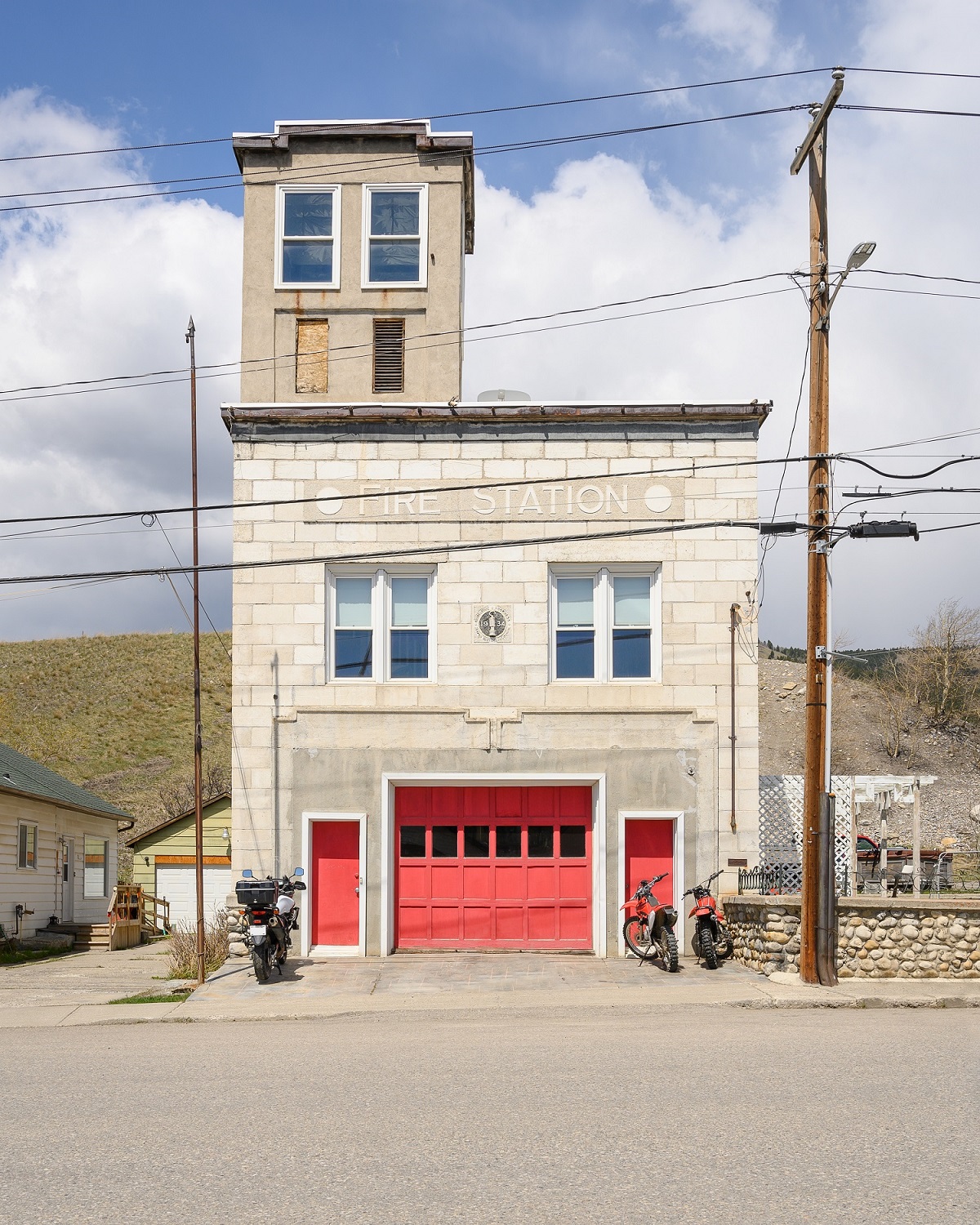
The old fire hall in downtown Coleman in the Crowsnest community in Alberta
The Frank Slide Interpretive Centre
The Frank Slide Interpretive Centre is worth a stop simply for the views – “the best views in the Crowsnest Pass” – according to Dawn. Check with the Interpretive Centre for opening hours. (It was closed due to COVID-19 during our visit).
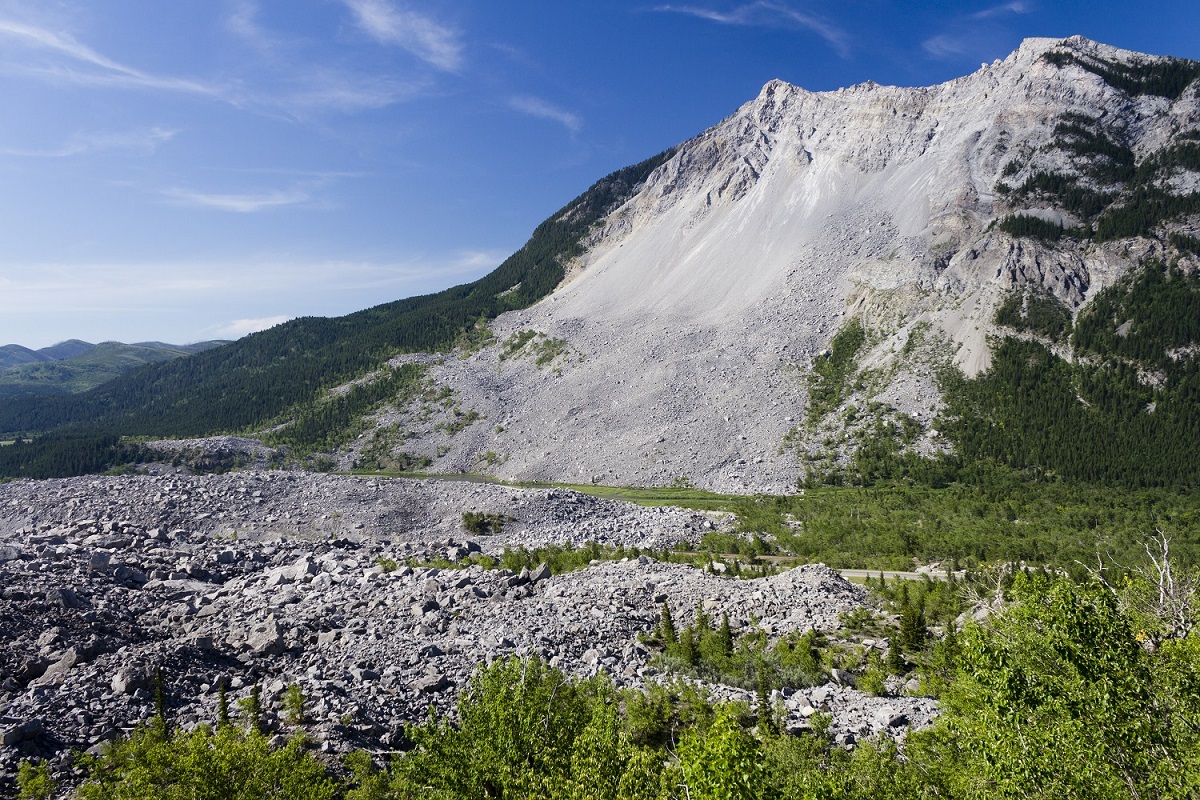
The Frank Slide was a rockslide that buried part of the mining town of Frank, Alberta, Canada at 4:10 am on April 29, 1903. Over 82 million tonnes of limestone rock slid down Turtle Mountain. The landslide is Canada’s deadliest in history killing 90 people.
Allison-Chinook Lake Provincial Recreation Area
The Allison-Chinook Lake Provincial Recreation Area, eight km west of Coleman off Highway 3, boasts a trail network run by a dedicated local Nordic ski club, the Crowsnest Pass Cross-Country Ski Association. This is a wonderful destination for skiers of all levels, with more than 30 km of groomed cross-country ski trails (mostly for classic skiing, along with several km for skate skiing, groomed through to about March 31) in rolling, wooded terrain along the eastern edge of the Continental Divide.
Use of the trails is by donation, online or at the trailhead. The area is also popular with hikers, snowshoers and fat bikers. And there are dog-friendly trails that are accessible from the Tecumseh Parking area.
Rainbow Falls, Miners’ Path
Rainbow Falls is accessed via the historic Miners’ Path from Flumerfelt Park in Coleman. Miners’ Path is the path that miners took to reach the McGillivray Mine in the early to mid-20th century. Today, visitors of all ages can enjoy this short, easy one-km walk to the falls. The trail is maintained by the Coleman Lions Club and parallels Nez Perce Creek. You may want to bring a hiking pole for the upper section of the trail, which has a couple of steepish sections (there is a handrail, which we made good use of).
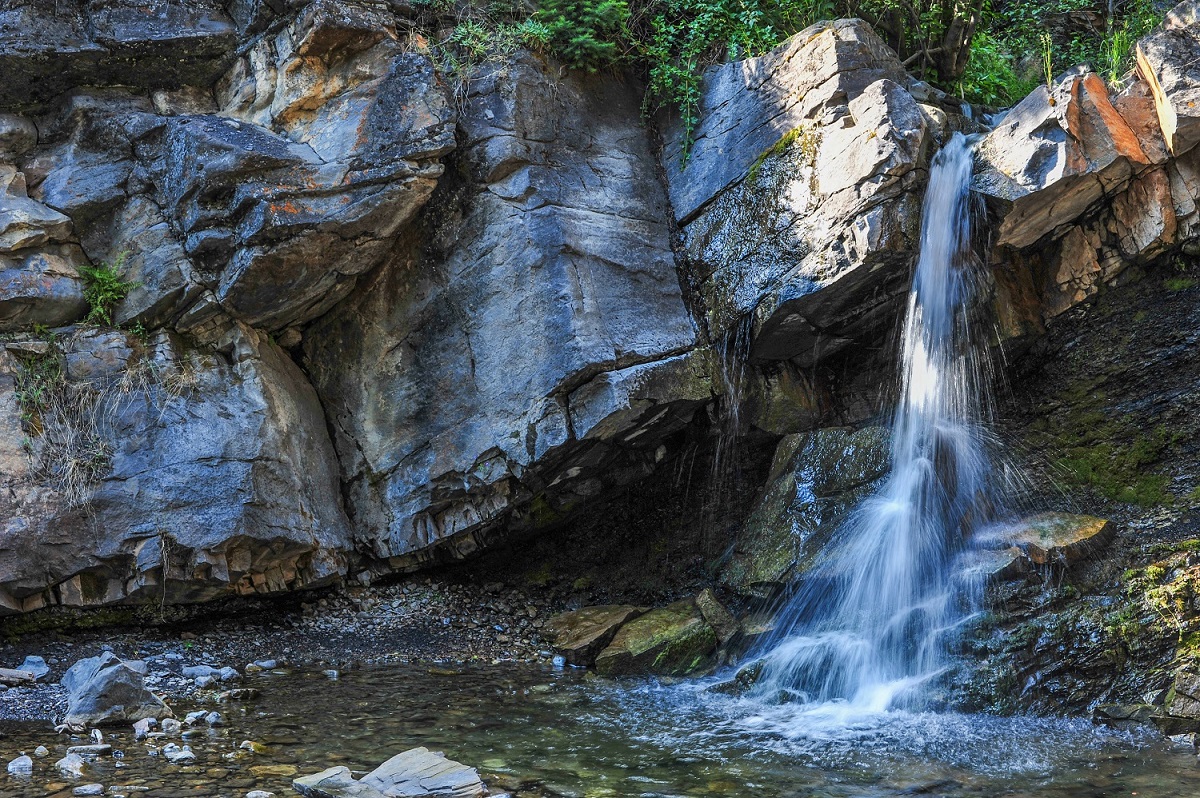
Rainbow Falls on the Miner’s Path hike in Coleman, Alberta
Encounters Wine Bar & Small Plate Kitchen
Country Encounters and Encounters Wine Bar & Small Plate Kitchen are located in downtown Coleman, a national historic site. Country Encounters B&B has a total of nine cosy, comfy guest suites in two buildings: one that is refurbished and originally built in 1904; and in a new building, directly across the street, which houses Encounters Wine Bar & Small Plate Kitchen on the main floor, with guest suites on the second floor.
“It’s a very large place, so there isn’t a concern you have to be with your host 24/7. People say it’s closer to an inn than a B&B,” says Dawn, a certified Red Seal chef and a former SAIT instructor. “We love to have people come to visit. It’s safe, it’s friendly, and the great outdoors is right out your back door.”
Encounters Wine Bar & Small Plate Kitchen specialises in small plates (appetizer-sized portions, inspired by the Spanish tradition of tapas). The menu is very international, with Spanish and Asian influences, curries, and lots and lots of Italian.
On a recent trip to Coleman, our very delicious and satisfying meal included grilled vegetables with whipped goat cheese and bacon-wrapped dates stuffed with goat cheese and drizzled in balsamic vinegar – along with several other small plate dishes. This was all topped off by gluten-free chocolate pate cake for dessert, which my partner could not stop raving about:
“That is really, REALLY chocolatey. It is SO chocolatey,” he said. “It’s incredible! It goes so well with the strawberries. Wow! It’s dark chocolate, so dark. Mmmmm! It’s outrageous, and it’s so good. It could not be more chocolatey. It’s not too sweet. It’s so rich, it’s like a chocolate transfusion . . . It’s decadent.”
Encounters Wine Bar & Small Plate Kitchen’s winter hours for dinner are Thursday through Sunday, by reservation only, from 4 p.m., and the last reservation is at 8 p.m. In spring-summer, it’s open Wednesday through Sunday from 4 p.m., with the last reservation at around 9:30 p.m.). All COVID-19 measures are in place.
Encounters Wine Bar & Small Plate Kitchen hosts the Crowsnest Corked Wine Club on the third Thursday of every month, with participants tasting four wines. If you visit the Crowsnest Pass, you are more than welcome to attend and can reserve your spot by calling (403) 563-5299.
“We just have fun around here. We meet a lot of people from a lot of different places, and it’s very gratifying when they are happy and have a good time,” Dawn says.
Beauvais Lake Provincial Park
Just east of the Crowsnest Pass is Beauvais Lake Provincial Park, situated in the foothills on the Rockies’ eastern slopes. An approximately 20-minute drive from Pincher Creek, Beauvais Lake Provincial Park is as beautiful in winter as it is in summer. Ice fishing is popular at the lake, which is stocked with hatchery-raised trout.
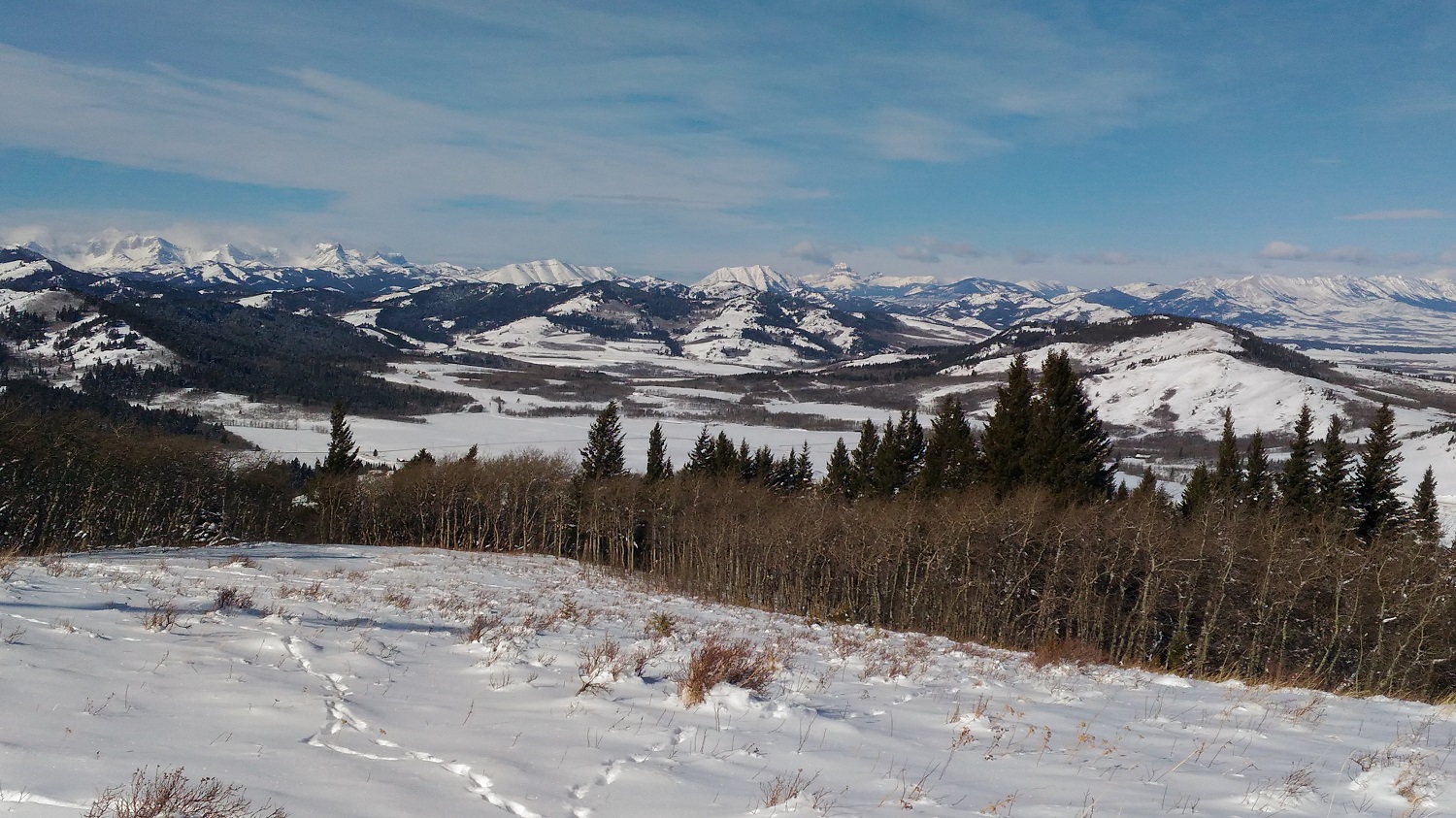
Beauvais Lake Provincial Park From the summit of Mount Baldy, we look north towards the Porcupine Hills, and west to the Crowsnest Pass. Photo Jaqueline Louie
If you’re looking to stretch your legs, you can walk Beauvais Lake Park’s multi-use trails or set out on snowshoes or cross-country skis. While the trails aren’t track set, they are reasonably easy to navigate and not crowded, so it mostly feels like you’ve got the place to yourself.
We head out on skis at Beauvais Lake with a friend, Edwin Knox, who worked in resource conservation at Waterton Lakes National Park for three decades. Our nearby objective is Mount Baldy (it’s actually more of a hilltop than a mountain), whose gentle trail takes you to the top. Just shy of the summit, we stop to admire a magnificent Douglas fir tree, whose trunk girth at chest height is approximately five metres. This tree is likely to be amongst the oldest living Douglas Fir trees in Alberta – possibly 600 or more years, Edwin figures.
He explains that Douglas firs are an important part of a forest ecosystem that sees low to moderate intensity fires periodically. “Periodic fire here is as natural as rain and sunshine – the Douglas fir evolved with wildfire.” However, due to the past century of fire suppression and the effects of climate change, he worries about the fate of old giants like the Big Fir that live in old-growth forests and montane ecoregions. In catastrophic, unnaturally intense wildfires, such as the 2017 Kenow Wildfire in nearby Waterton Lakes National Park, “centuries-old Douglas fir trees burned to a crisp.”
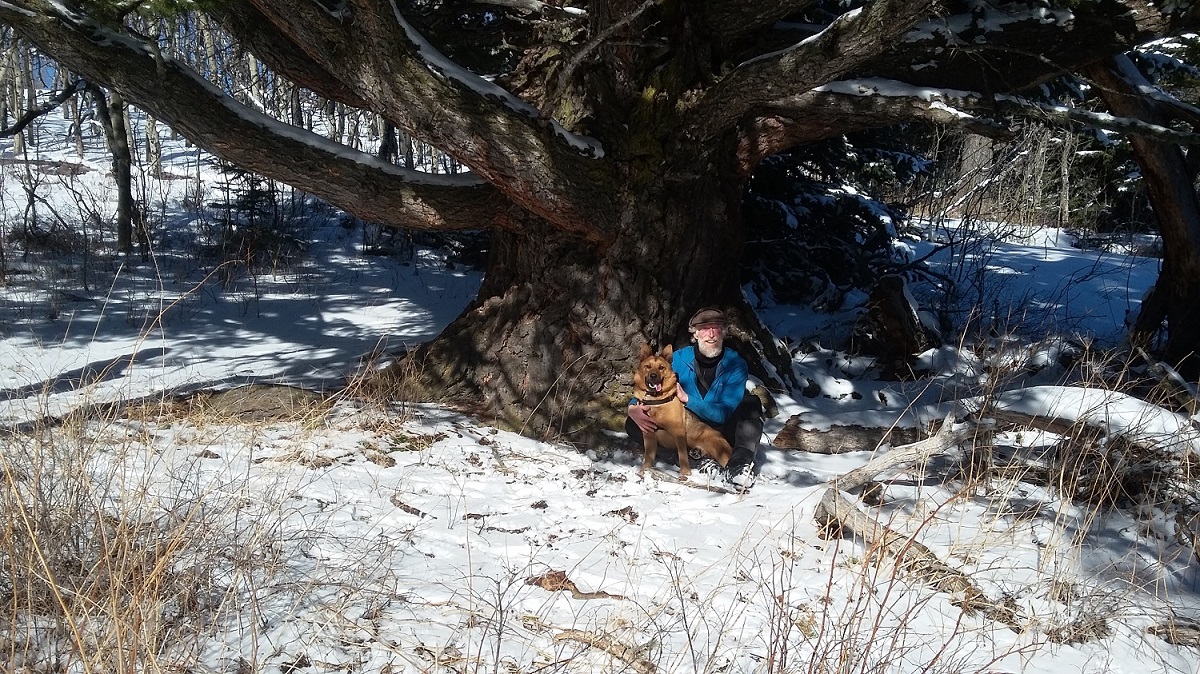
Edwin Knox, his dog Oka, and the Big Fir, near the summit of Mount Baldy, in Beauvais Lake Provincial Park Photo by Chuck Newyar
Fire suppression (to protect people, infrastructure and land) left a legacy of older, closed-in forest, loss of wildlife habitat, loss of diversity and increased risk of uncontrollable wildfires, notes Jane Park, a fire and vegetation specialist with Parks Canada.
Someday, there will be another big, unnaturally intense wildfire, Edwin says, and the thick forest on Baldy, including large amounts of deadwood – is “a kindling box, primed to fuel the next wildfire.”
According to Edwin, there are options to save old-growth forests by reducing the fuel load around the base of ancient trees like the Big Fir, and some parks have done this successfully.
Edwin recreates in Beauvais Lake Provincial Park year-round. “It’s just a wonderful little park. It’s very gentle terrain and accessible to a wide variety of users, with well-marked trails. All the big wildlife is there – cougar, bear, moose, elk and deer.” Owls live here, and in the spring and fall, you can spot eagles migrating along the Rocky Mountain Flyway.
When outdoors, “park users need to educate themselves,” Edwin says – for example, hike in a group, carry bear spray, and tell people where you are going – these and other good habits can help ensure a safe and enjoyable outing.
The author was a dinner guest of Encounters Wine Bar & Small Plate Kitchen. They did not review or approve this article.

